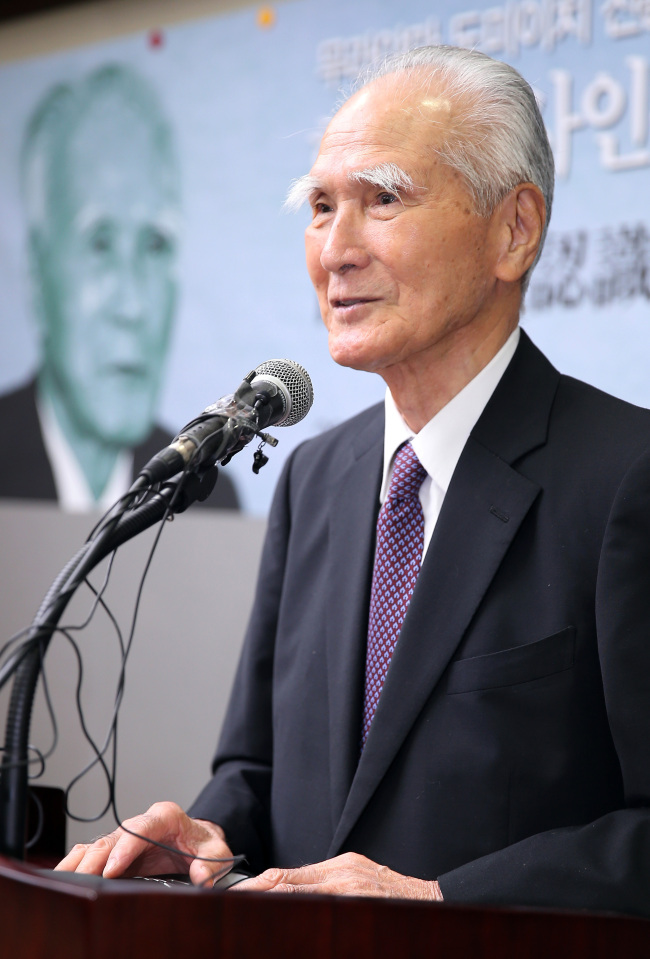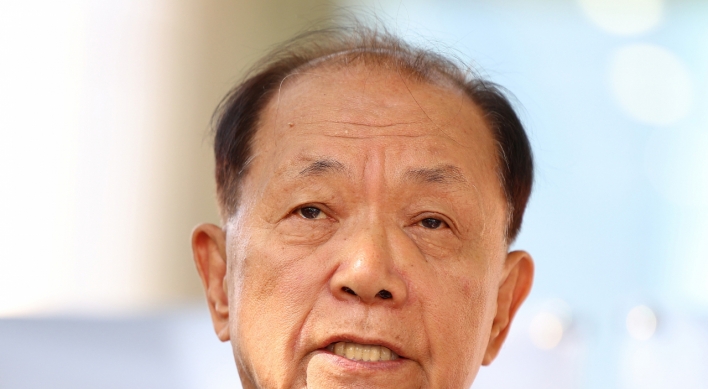A former Japanese prime minister, who offered a landmark apology for the country’s wartime atrocities, lashed out at incumbent Prime Minister Shinzo Abe on Friday for his ongoing attempts to chip away at Tokyo’s previous efforts to atone for its imperial past and move relations with neighbors forward.
Tomiichi Murayama called on Abe to follow through on his promise to uphold previous apologies, which he said serve as foundations for better Seoul-Tokyo ties.
Marking the 50th anniversary of the end of World War II in 1995, he apologized for Japan’s “colonial rule and aggression,” calling it an “unquestionable historical fact.”
The Murayama Statement paved the way for rapprochement between the two countries, together with a 1993 apology in which then-Chief Cabinet Secretary Yohei Kono acknowledged and apologized for operating “comfort stations” and forcing women to provide sex to the Japanese Imperial Army during World War II.
“As the anniversary approached, I was compelled to do something about postwar issues at home and abroad because 50 years after the war Japan stood as the world’s second-largest economy but had yet to clear up its war crimes or come up with postwar settlements, which could rekindle concerns about its possible reemergence as a military power,” Murayama said at a seminar hosted by the Northeast Asia History Foundation in Seoul.
“I was able to offer the statement with the blessing of the cabinet despite resistance from the Liberal Democratic Party, a bigger coalition partner.”
Endorsed by successive administrations, his statement became a “national promise,” Murayama said. Tokyo’s relations with Seoul and Beijing improved significantly, with its prime ministers holding fence-mending bilateral summits with Presidents Kim Dae-jung and Hu Jintao.
The 90-year-old retired politician questioned what drove Abe to change course and arrive at his current defiant attitude, given that during his first premiership in 2006-07 he vowed to uphold the apology.
“I never thought the Murayama Statement would become a source of contention at this point,” he said.
Tomiichi Murayama called on Abe to follow through on his promise to uphold previous apologies, which he said serve as foundations for better Seoul-Tokyo ties.
Marking the 50th anniversary of the end of World War II in 1995, he apologized for Japan’s “colonial rule and aggression,” calling it an “unquestionable historical fact.”
The Murayama Statement paved the way for rapprochement between the two countries, together with a 1993 apology in which then-Chief Cabinet Secretary Yohei Kono acknowledged and apologized for operating “comfort stations” and forcing women to provide sex to the Japanese Imperial Army during World War II.
“As the anniversary approached, I was compelled to do something about postwar issues at home and abroad because 50 years after the war Japan stood as the world’s second-largest economy but had yet to clear up its war crimes or come up with postwar settlements, which could rekindle concerns about its possible reemergence as a military power,” Murayama said at a seminar hosted by the Northeast Asia History Foundation in Seoul.
“I was able to offer the statement with the blessing of the cabinet despite resistance from the Liberal Democratic Party, a bigger coalition partner.”
Endorsed by successive administrations, his statement became a “national promise,” Murayama said. Tokyo’s relations with Seoul and Beijing improved significantly, with its prime ministers holding fence-mending bilateral summits with Presidents Kim Dae-jung and Hu Jintao.
The 90-year-old retired politician questioned what drove Abe to change course and arrive at his current defiant attitude, given that during his first premiership in 2006-07 he vowed to uphold the apology.
“I never thought the Murayama Statement would become a source of contention at this point,” he said.

“At the time it was credited with ushering in a new chapter in the Korea-Japan and China-Japan relationships. I deeply regret that this did not take place.”
But the Murayama administration’s remedy also had its own constraints.
For instance, Japan created a private fund, called the Asian Women’s Fund, to provide some 360 survivors in Korea, the Philippines, Taiwan and the Netherlands with a publicly raised indemnity valued at 565 million yen ($5.5 million) and state-backed medical support worth 750 million yen.
Yet a majority of the Korean survivors refused to accept the private money as it suggested that the Japanese government was responsible morally but not legally.
Tokyo argues that its legal responsibility was already accounted for through the 1951 San Francisco Peace Treaty with Allied Powers and a bilateral 1965 accord that normalized its diplomatic relationship with Korea.
“The problem with the fund was that Japan pressed ahead with the plan without securing any understanding or consent from Korea,” said Haruki Wada, a professor emeritus of the University of Tokyo, who was then the fund’s executive director.
“The biggest lesson that we learned from it was that without cooperation between the two countries’ peoples, no measure can be taken to heal the wounds of the victims and soothe emotional confrontation.”
Despite the dismal outlook for the current negotiations, Murayama called for “candid” dialogue and further efforts to reach a resolution.
“Though Abe has shown some volatility in his attitude toward the existing apologies, one thing that is clear is that he thinks that Korea and Japan should reconcile and improve their relations,” he added.
“With the number of survivors falling, I hope the two governments face up to the current situation and intensify efforts to collect their wisdom as they did in past administrations.”
By Shin Hyon-hee (heeshin@heraldcorp.com)







![[KH Explains] No more 'Michael' at Kakao Games](http://res.heraldm.com/phpwas/restmb_idxmake.php?idx=644&simg=/content/image/2024/04/28/20240428050183_0.jpg&u=20240428180321)










![[Herald Interview] Mistakes turn into blessings in street performance, director says](http://res.heraldm.com/phpwas/restmb_idxmake.php?idx=652&simg=/content/image/2024/04/28/20240428050150_0.jpg&u=20240428174656)
